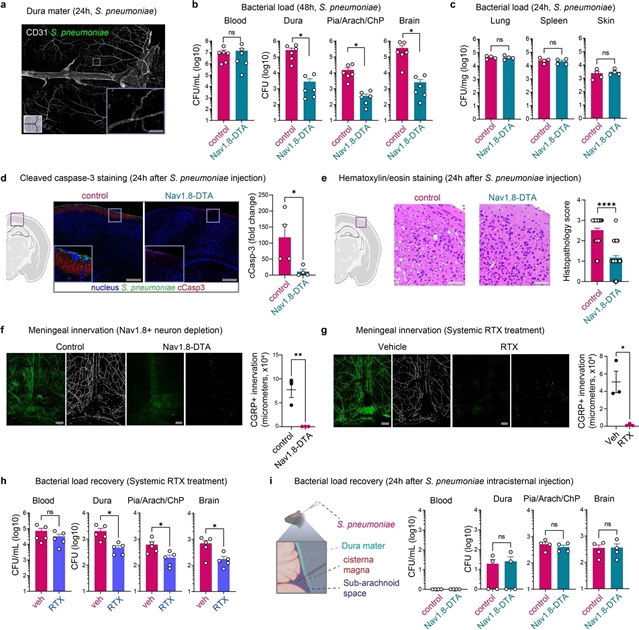
研究人员表明,在感染期间,Nav1.8+伤害感受器通过神经肽降钙素基因相关肽(CGRP)向脑膜的免疫细胞发出信号。这种神经免疫轴抑制了宿主的防御,加剧了细菌性脑膜炎。痛觉神经元的去除减少了两种细菌病原体对脑膜和大脑的入侵:肺炎链球菌和无乳链球菌。肺炎链球菌通过其形成孔毒素pneumolysin激活伤害感受器,从神经末梢释放CGRP。CGRP通过受体活性修饰蛋白1(RAMP1)作用于脑膜巨噬细胞,使其转录反应极化,抑制巨噬细胞趋化因子的表达、中性粒细胞的招募和硬脑膜抗菌防御。巨噬细胞特异性RAMP1的缺乏或RAMP1的药物阻断增强了免疫反应和脑膜和大脑中的细菌清除。因此,细菌劫持了脑膜巨噬细胞的CGRP-RAMP1信号来促进大脑的入侵。瞄准脑膜中的这一神经免疫轴可以增强宿主的防御能力,并有可能产生对细菌性脑膜炎的治疗。
据了解,脑膜受到密集的痛觉感觉神经元的支配,这些神经元可以介导疼痛和头痛。细菌性脑膜炎导致威胁生命的脑膜和中枢神经系统的感染,每年影响250多万人。疼痛和神经免疫的相互作用如何影响脑膜的抗菌宿主防御尚不清楚。
附:英文原文
Title: Bacteria hijack a meningeal neuroimmune axis to facilitate brain invasion
Author: Pinho-Ribeiro, Felipe A., Deng, Liwen, Neel, Dylan V., Erdogan, Ozge, Basu, Himanish, Yang, Daping, Choi, Samantha, Walker, Alec J., Carneiro-Nascimento, Simone, He, Kathleen, Wu, Glendon, Stevens, Beth, Doran, Kelly S., Levy, Dan, Chiu, Isaac M.
Issue&Volume: 2023-03-01
Abstract: The meninges are densely innervated by nociceptive sensory neurons that mediate pain and headache1,2. Bacterial meningitis causes life-threatening infections of the meninges and central nervous system, affecting more than 2.5million people a year3,4,5. How pain and neuroimmune interactions impact meningeal antibacterial host defences are unclear. Here we show that Nav1.8+ nociceptors signal to immune cells in the meninges through the neuropeptide calcitonin gene-related peptide (CGRP) during infection. This neuroimmune axis inhibits host defences and exacerbates bacterial meningitis. Nociceptor neuron ablation reduced meningeal and brain invasion by two bacterial pathogens: Streptococcus pneumoniae and Streptococcus agalactiae. S.pneumoniae activated nociceptors through its pore-forming toxin pneumolysin to release CGRP from nerve terminals. CGRP acted through receptor activity modifying protein 1 (RAMP1) on meningeal macrophages to polarize their transcriptional responses, suppressing macrophage chemokine expression, neutrophil recruitment and dural antimicrobial defences. Macrophage-specific RAMP1 deficiency or pharmacological blockade of RAMP1 enhanced immune responses and bacterial clearance in the meninges and brain. Therefore, bacteria hijack CGRP–RAMP1 signalling in meningeal macrophages to facilitate brain invasion. Targeting this neuroimmune axis in the meninges can enhance host defences and potentially produce treatments for bacterial meningitis.
DOI: 10.1038/s41586-023-05753-x
Source: https://www.nature.com/articles/s41586-023-05753-x
Nature:《自然》,创刊于1869年。隶属于施普林格·自然出版集团,最新IF:69.504
官方网址:http://www.nature.com/
投稿链接:http://www.nature.com/authors/submit_manuscript.html
